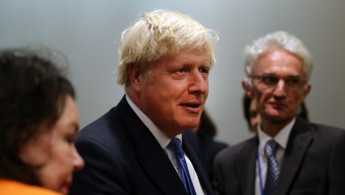Boris Johnson invites Iran's Rouhani to London, calls for progress over detained citizens
Johnson met with Rouhani at the United Nations General Assembly in New York on Tuesday, two days after he accused Tehran of being behind attacks on Saudi oil installations.
According to the Press Association, the prime minister shared his "deep concern" about Iran's actions in the Gulf region. Johnson confirmed his support for the Iran nuclear deal, Downing Street said, adding that he "stressed the need for dialogue, including on a comprehensive successor deal".
Johnson also took a moment at the beginning of the meeting to invite Rouhani to London "where we can discuss things more".
"But there are other issues also I wish to raise with you and we retain serious concerns about the detention of dual nationals in Tehran and we are looking forward to make progress on that," he said.
A number of dual British Iranian nationals are currently being held in Iran, including Nazanin Zaghari-Ratcliffe who was arrested in April 2016 on charges of plotting against the Iranian government. Her family denies the allegations.
Earlier this month, it was revealed that two British-Australians had also been detained in Iran.
Richard Ratcliffe, who has campaigned tirelessly on behalf of his wife Nazanin has called on Johnson to tell Rouhani that "enough is enough".
|
Ratcliffe admitted in June that he "resented" Johnson for how he handled her case during his time as Foreign Secretary, saying Johnson "made a promise that he wasn't able to deliver on", in comments to the BBC's Andrew Marr Show.
Johnson said in 2017 that Zaghari-Ratcliffe was working in Tehran to train journalists - comments that were later used to bolster Iran's allegations that she was engaged in "propaganda against the regime".
In their meeting the prime minister told Rouhani that his 2017 visit to Tehran was "very productive but so far inconclusive", the Press Association reported.
"I think we still have a lot of progress to make," he added.
'Better deal'
Johnson said Monday that US President Donald Trump could negotiate a nuclear deal with Iran "better" than what Tehran and world powers agreed to in 2015.
"Let's do a better deal," Johnson said in an interview with NBC while in New York for the UN General Assembly.
"I think there's one guy who can do a better deal... and that is the president of the United States. I hope there will be a Trump deal," added the prime minister.
He also formally accused Iran of carrying out air attacks on Saudi Arabia's Abqaiq plant and the Khurais oil field on 14 September, knocking out half the kingdom's oil production.
Iran denies responsibility for the attacks which were claimed by Iranian-backed Houthi rebels in Yemen.
While in New York, Johnson met with German Chancellor Angela Merkel, and France President Emmanuel Macron and issued a joint statement on claims that Iran hit the two Aramco installations.
Read also: Fury as Brexit MEPs abstain on vote to release Nazanin Zaghari-Ratcliffe from Iran jail
But the leaders said they would stick to a nuclear deal with Tehran which the US abandoned in 2017.
"The time has come for Iran to accept negotiation on a long-term framework for its nuclear programme as well as on issues related to regional security, including its missiles program and other means of delivery," the three European leaders said in a statement, referring to parts of an agreement Iran has broken since the US withdrawal.
President Donald Trump pulled out of a nuclear deal agreed with Iran in 2015 last year, with European countries trying to keep the agreement alive.
Agencies contributed to this report.





 Follow the Middle East's top stories in English at The New Arab on Google News
Follow the Middle East's top stories in English at The New Arab on Google News


